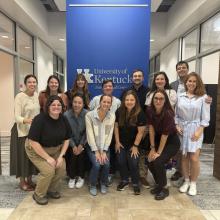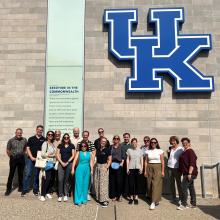Partnership Perspectives: Deepening Cultural Insights and Understanding

In the waning days of the COVID-19 pandemic, universities around the world faced the challenge of restarting international academic mobility in vastly different regulatory and cultural contexts. The high-touch student support culture of U.S. higher education was particularly challenged during this time, as international education administrators were faced with striking contrasts in the varied ways that other higher education systems conceptualized student support services.
At the University of Kentucky (UK), we saw these differences surface repeatedly as we engaged with exchange partners and third-party providers alike to align on-site support abroad with our on-campus expectations for student support. These interactions revealed the differences in how institutions around the world approached managing the pandemic—and shed light more broadly on the various approaches to student support in different cultural contexts. Questions about contact tracing, housing policies, and other COVID-related restrictions and support measures that U.S. universities viewed as standard sometimes confused our partners abroad.
The pandemic made it clear that student support systems, and the cultures underlying university administrations, differ widely across borders. But it also opened the door to deeper reflection on how our institutional and national cultures shape our assumptions about students, partnership, and shared responsibility.
Fostering Authentic Partnerships
In the years following the pandemic, it became clear that truly effective collaboration and partnership had to go beyond traditional topics like exchange agreements, curricular alignment, or research ties. We needed to take a step back and have a conversation about something more fundamental—how cultural context influences and informs institutional pressures, student expectations, and administrative priorities in different systems around the world.
In 2023, UK partnered with the German-American Fulbright Commission to host the first U.S.-based Fulbright International Education Administrators seminar focused on student support, student affairs, and risk management in U.S. international education. Though the German participants all had extensive experience in campus internationalization, the weeklong dialogue revealed just how differently we operated within our respective educational cultures, how little those differences had been explored, and how understanding those differences could transform partnerships.
Building on that program, we partnered with WorldStrides in 2024 to bring program directors from top program sites to campus for similar discussions. Many had worked with U.S. students for years but had never experienced a U.S. campus firsthand, limiting their ability to fully contextualize student behavior and expectations.
And again in 2025, we renewed the Fulbright partnership in Germany with similar outcomes and deeper insights. These initiatives demonstrate how conversations grounded in cultural understanding can foster more authentic, sustainable, and effective international partnerships in several key ways.
1. We helped our overseas partners deepen their understanding of U.S. students: their motivations, the pressures they face, and the structures they are accustomed to at home.
At their core, the seminars were about helping our international colleagues better understand U.S. students. We started each week with some lighthearted conversations about some of the stereotypes that educators abroad often associate with U.S. students (and I’m sure you can guess a few of those). But once each seminar got underway, we dug deeper—looking at the ways that the history of U.S. higher education as well as our national and institutional cultures have shaped the systems that drive certain student behaviors, expectations, and demands.
“Talking with the participants about the financial realities faced by students and education abroad offices was incredibly valuable.” —Niamh Larson
Seeing our colleagues connect the dots between those elements in real time, and watching them build a more profound understanding of the unique financial and academic pressures U.S. students face was both fascinating and inspiring to watch. “It was my first time visiting a university campus in the United States, so I was excited and curious to see how everything worked,” said Cristina Canales Contador, WorldStrides’s resident director in Barcelona. “It really helped me see how students live on campus and get a feel for their everyday life. That gave me a much clearer idea of what they might expect when they come to Barcelona.”
2. We helped our partners better understand the practical realities of international education on a U.S. campus.
Although exchanges remain integral to U.S. universities’ international mobility strategies, many of our colleagues from Germany were not fully aware of the U.S. student demand for short-term programs, faculty-directed programs, or third-party programs coordinated by U.S. partners—programs that often include significant student support structures. “We have realized that we are in direct competition with third-party providers with our exchange programs,” said Jörg Noldin, deputy head of the international office at Hof University of Applied Sciences. “We must consider how to modify some of our programming to meet the needs of American students.”
“[The seminar] has directly influenced the way we prepare and support our students while they are on the ground with us.” —Pedro José Pérez Polo
The relationship between finances and international education was also a major focus of discussion with German colleagues, who operate within very different budgetary models. “Talking with the participants about the financial realities faced by students and education abroad offices was incredibly valuable,” said Niamh Larson, executive director of education abroad and exchanges at UK. “Those conversations sparked new ideas for innovative, marketable programming on U.S. campuses. Our students are very price-sensitive, and the level of on-site support often drives their interest in a program. We have to think beyond traditional exchange models to design programming that broadly appeals to today’s students.”
3. We reflected on our own work through the lens of colleagues encountering U.S. campus culture for the first time.
Hosting these colleagues on our campus was anything but a one-way exchange. Their visits gave our UK staff the rare opportunity to see our work through fresh eyes—to question the assumptions we bring to the office each day and to think critically about our operations.
With administrators from offices as diverse as campus housing, risk management, and financial aid joining the discussions, colleagues at the university who don’t usually work in international education also had the chance to view their roles through a global lens. The result was a ripple effect across campus, with offices gaining a broader sense of what higher education looks like beyond U.S. borders and building the kinds of relationships that rarely happen in traditional partnership meetings, which often stay within the usual international education circles.
4. We formed deep, lasting bonds with colleagues abroad that resulted in new “traditional” partnerships, in addition to building mutual understanding.
In the end, it turned out that a focus on building understanding resulted in new traditional partnerships—but those partnerships ended up being more tailored to the specific needs of departments and students than we had experienced before. One such conversation led directly to UK’s engagement of a new social work and education partnership with Universität Vechta (Vechta). “My participation in the seminar laid the foundation for a partnership that has already yielded results through several Erasmus+ projects,” said Natalia Petrillo, head of Vechta’s international office. “It has enabled us to strengthen both the European and transatlantic dimensions of our academic community.”
Similarly, the deeper understanding and stronger personal connections built between our education abroad team and colleagues at WorldStrides are already producing tangible results. Next semester, nearly 100 UK students are expected to participate in their Barcelona program—a significant increase from previous terms. This growth reflects the collaboration that emerged after the seminar as well as a more focused and shared understanding of what our students need to succeed abroad.
“The seminar had an important practical impact,” said Pedro José Pérez Polo, WorldStrides’s director of central European operations. “It gave us a much broader perspective on where our students are coming from and, more importantly, their expectations. It has directly influenced the way we prepare and support our students while they are on the ground with us.” •
About International Educator
International Educator is NAFSA’s flagship publication and has been published continually since 1990. As a record of the association and the field of international education, IE includes articles on a variety of topics, trends, and issues facing NAFSA members and their work.
From in-depth features to interviews with thought leaders and columns tailored to NAFSA’s knowledge communities, IE provides must-read context and analysis to those working around the globe to advance international education and exchange.
About NAFSA
NAFSA: Association of International Educators is the world's largest nonprofit association dedicated to international education and exchange. NAFSA serves the needs of more than 10,000 members and international educators worldwide at more than 3,500 institutions, in over 150 countries.
NAFSA membership provides you with unmatched access to best-in-class programs, critical updates, and resources to professionalize your practice. Members gain unrivaled opportunities to partner with experienced international education leaders.
















